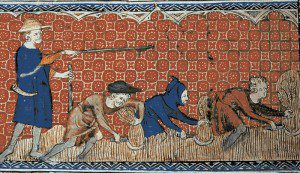
When smart people get behind a bad idea you should wonder if you’re being scammed.
That’s what I’m wondering about when it comes to the latest thing millennials have gotten excited about, something called, “The Sharing Economy”. (Sounds benign, doesn’t it? Who could be against sharing?)
Here’s the gist of it: ownership, bad; use, good.
Ownership is wasteful, and that’s bad for the environment, we’re told. But use is what we’re really after anyway. So why own a car when there’s Uber? Just use that Uber app and you’ve got your ride. No storage problem, no maintenance to worry about, no insurance to pay. All you want is a ride, right? Let other people worry about that other stuff. And when self-driving cars come along, it won’t even be a person’s problem. The machines will do it all. (You can read more about it here, and here, and here.)
As you can see, this is all made possible by technology.
The folks in Silicon Valley invent a lot of stuff. But the really powerful stuff they make is not the technology, it’s the ideas that go along with the technology. Those ideas are sold for free, but they’re really designed to get us to buy other stuff for money.
What this has got me wondering is whether or not some folks from the Ministry of Truth have gone over to the private sector.
There are some sly moves here.
First, it is assumed that ownership is just consumption.
This is largely due to the fact that hardly anyone can imagine that ownership could be anything but consumption. And this is because most people don’t own productive property. They merely own personal property. And personal property depreciates, or is made obsolete by newer, sleeker stuff.
So, since it is just going to end up in a landfill anyway, why not let someone else be burdened with ownership? You, because you’re such a savvy, hip, millennial can let someone else do the dirty work. You can just rent! You remain unburdened and to top it off, you get to pat yourself on the back because you’re so environmentally conscious!
You’re also a patsy.
What gets hidden in this is productive property. It doesn’t occur to the savvy millennial that the reason people own productive property is to make money. Someone owned the manor that the serfs worked, you may recall. (If you were educated in a public school, here’s a link to a page that will explain what a serf was.)
Here’s the second thing this business model obscures: ownership of productive property is a school of virtue.
The founders of our country were not the benighted villains they have been written off as. One of their best ideas was making ownership of property a precondition for the right to vote.
Today that seems so unjust, even absurd. How could they be so stupid?
Well, maybe, just maybe, they had a good reason.
They didn’t have personal property in mind, the sort that depreciates rapidly and ends up in a land fill. What they meant by property is the sort of thing Uber owns–productive property.
But unlike Uber, they didn’t hide ownership, or want it to be concentrated in the hands of a corporate elite. They believed the broad distribution of productive property–farmland, small businesses, even tools–would make people prudent and responsible. And these virtues would be conducive to good government.
Paradoxically it also made people both self-sufficient and public-spirited. People relied on their skills, and their genuine business savvy, while at the same time being dependent upon the people they sold their goods to.
The Proletariat doesn’t own, it rents
You know, Marx didn’t coin the word, “proletariat”. It comes down to us from the Roman census. The Proletariat in the census were freemen without property. They were as low as you could go without being a slave. They were the plebs, the mob.
And the mob always votes for Cesar, or Bernie.
This is because plebs have no other recourse. They need someone to take care of them because they can’t take care of themselves.
The concentration of productive property in the hands of the few can happen in a variety of ways. One of those ways is an economic crisis. I’m afraid that our enthusiasm for the biblical Joseph blinds us to the fact that Joseph helped Pharaoh acquire all the productive property in Egypt. He was a really decent guy on a personal level, but he was also a statist.
(There are people today who would like to do what Joseph did, for much the same reason. You may recall, Joseph’s family eventually ended up in slavery.)
If we’re going to see virtue, and genuine public-spirit, come back, we shouldn’t sell our freedom for conveniences that will make us slaves. We should burden ourselves with productive property, because by carrying burdens we will grow strong.












